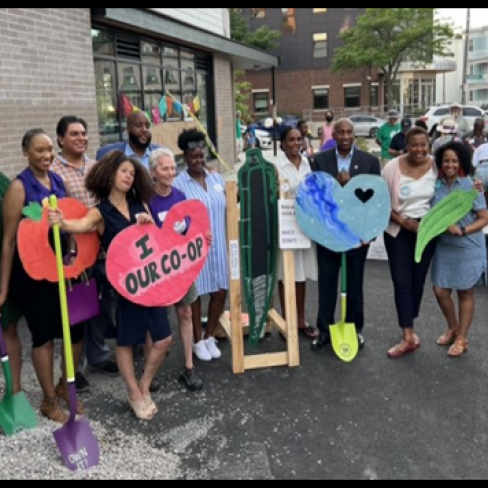Cooperative Fund of the Northeast & Dorchester Food Co-op
Dorchester

Co-ops align really well with the population that MGCC is trying to serve through the SBTA program.
MGCC Celebrates National Co-op Month
Sharing an inspiring story about co-op success and the technical assistance they received
In the United States, more than 40,000 cooperatives support jobs that provide more than $25 billion in wages, with more than 350 million members. That last figure might have caught you somewhat off-guard. That’s because co-ops are so important to some local residents, economies and communities where many people are members of more than one co-op. Co-ops are a trusted and proven way to conduct business and build communities.
As October comes to an end, MGCC takes this annual opportunity to honor the local support provided to cooperatives and how it’s made a difference in our communities. Through the support of MGCC’s Small Business Technical Assistance (SBTA) Grant Program, nonprofit organizations across the Commonwealth work to help small businesses by providing training in business skills such as accounting and marketing, technical assistance, and access to financing.
"Technical assistance for co-ops includes governance and participatory management training,” said Ari Velóz, MGCC Community Program Manager. “Access to these types of training is key to supporting worker-owners not only manage the day-to-day operations more efficiently, but it also increases their profitability.”
Of the 59 nonprofit grantees of MGCC’s FY23 SBTA Grant Program, two focus solely on co-ops, the Cooperative Fund of the Northeast (CFNE) and the Boston Center for Community Ownership, while the Local Enterprise Assistance Fund (LEAF) and Boston Impact Initiative (BII) prioritize co-ops through their work. We are pleased to share an inspiring story about a TA Provider and cooperative relationship that has successfully served their member-owners and community:
Dorchester Food Co-op (DFC) is a hybrid worker-consumer cooperative grocery store that has been working since 2011 to bring affordable healthy food and economic development to Dorchester, an underserved area of Boston and the city’s largest neighborhood.
Challenge:
Launching a food co-op is a long and complex process, with non-profit, philanthropic, and governmental partners providing expertise in everything from store design to grant funding. DFC needed assistance launching the enterprise and creating business plans and projections, member recruitment, and identifying and securing access to financing.
Solution:
CFNE's lending team, with over 40 years of experience working with food cooperatives, wanted to ensure that DFC would have the members, shoppers, and cash flow to make a strong start.
“We tried to help them understand where the member drive fits into their overall capital plans and also just developing good financial projections that take into account how long is it going to take to break even and what are the different types of capital,” Carolyn Edsell-Vetter of CFNE.
In September 2021, CFNE provided 50% of the requested loan up front, and conditioned disbursal of the other 50% on DFC adding 150 new local members and matching the investment with commitments from other funders. By December 31, 2021, DFC met CFNE’s loan conditions, adding 291 members, and raising additional financing toward their capital campaign.
Impact:
CFNE’s commitment of support and funding strengthened DFC’s balance sheet, allowing it to receive over $1.5 million in foundation and government grants, including competitive grants such as the Cummings Foundation competitive three-year grant.
DFC broke ground on its new building in July, with doors scheduled to open early next year, and has a growing membership of over 1,400 households.
In addition to short-term construction jobs, the opening of DFC will create approximately 20 stable, living-wage jobs with a priority for hiring residents of the local low-income community. The store will keep $1 million in revenue annually in the community through local hiring and sourcing from regional and diverse suppliers.
